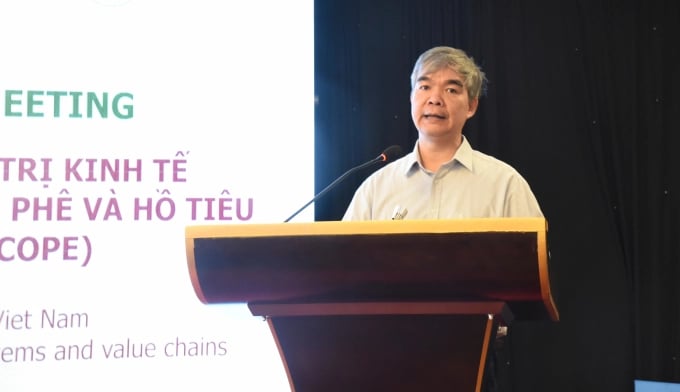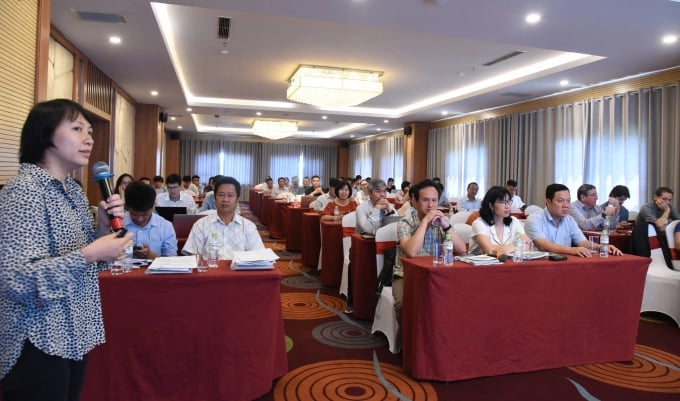June 18, 2025 | 19:48 GMT +7
June 18, 2025 | 19:48 GMT +7
Hotline: 0913.378.918
June 18, 2025 | 19:48 GMT +7
Hotline: 0913.378.918
On the morning of June 22, in Buon Ma Thuot City (Dak Lak), the initiation meeting for the Project to Improve the Sustainability, Productivity, and Economic Value of the Coffee and Pepper farming chains in the Central Highlands (V-SCOPE Project) took place.
The Australian Center for International Agricultural Research (ACIAR) implemented the project with funding from JDE Company, the World Agroforestry Centre (ICRAF) in Vietnam, and The French Agricultural Research Centre for International Development (CIRAD)...
The V-SCOPE's goal is to improve the livelihoods of smallholder farmers in the Central Highlands, especially vulnerable farmers. The project aims to achieve this by improving sustainability and the value of coffee and pepper farming chains.

Mr. Nguyen Quang Tan, the ICRAF National Coordinator stated that the project will promote sustainable agricultural practices, including methods to improve soil health in coffee and pepper farms. Photo: Quang Yen.
The project consists of four main components: Improving soil quality and controlling soil-borne pests in coffee, pepper, and nursery farms; improving sustainable farming practices with greater economic efficiency and resource use; improving service delivery and managing the chain of sustainability certification standards… to support changes in people's activities; improve capacity to implement scaling strategies and ensure long-term adoption of sustainable farming systems, implementing value chains at the landscape level based on the environmental, socio-political contexts.
Dr. Nguyen Quang Tan, the ICRAF Country Coordinator, said that one of the current problems in the Central Highlands is land degradation due to the impact of unsustainable farming practices, especially overuse. chemicals in agricultural production. “Consequently, the V-SCOPE project will test, evaluate and promote sustainable agricultural practices, including methods to improve soil health in coffee and pepper farms,” said Mr. Tan.

Dr. Nguyen Mai Phuong, the V-SCOPE Deputy Coordinator, presented at the meeting. Photo: Quang Yen.
According to Mr. Estelle Bienabe, the V-SCOPE Project Coordinator, the team of experts designed and tested a new irrigation procedure during the first year of the project. The process will be adjusted in the coming years based on data on soil water infiltration, plant transpiration, and coffee production.
The knowledge gained in this process will help to accurately model the response of coffee and pepper under different climatic conditions. Consequently, the experts could perfect a climate-adaptive smart irrigation system for coffee and pepper in the Central Highlands.
The V-SCOPE project will be implemented from February 2021 to September 2024 in three provinces of Gia Lai, Dak Lak, and Dak Nong with the participation of nearly 300 coffee and pepper farming households.
Translated by Hoang Duy
![Turning wind and rain into action: [9] Digitizing hydrometeorological data in response to climate change](https://t.ex-cdn.com/nongnghiepmoitruong.vn/608w/files/news/2025/06/17/z6704423696987_15fd32ffc26d590d204d520c9dac6786-nongnghiep-165943.jpg)
(VAN) Farmers have begun accessing hydrometeorological applications to adjust their cropping schedules, aiming to ensure productivity and adapt to climate change.
![Turning wind and rain into action: [8] Real-time salinity detection and early warning technology](https://t.ex-cdn.com/nongnghiepmoitruong.vn/608w/files/news/2025/06/17/z6704423696987_15fd32ffc26d590d204d520c9dac6786-nongnghiep-151127.jpg)
(VAN) Thanks to the integration of modern hydrological-hydraulic models, remote sensing technologies, and artificial intelligence, the accuracy of hydrological forecasting has significantly improved.
![Turning wind and rain into action: [7] Early disaster warnings help marine farmers minimize losses](https://t.ex-cdn.com/nongnghiepmoitruong.vn/608w/files/news/2025/06/17/z6704423696987_15fd32ffc26d590d204d520c9dac6786-nongnghiep-142942.jpg)
(VAN) In recent years, thanks to early disaster warnings and forecasting, marine farmers in Khanh Hoa province have been able to reduce risks and losses, thereby improving production efficiency.
![Turning wind and rain into action: [6] ‘Four on-the-spot’ disaster management software](https://t.ex-cdn.com/nongnghiepmoitruong.vn/608w/files/news/2025/06/17/e5a48259d6a262fc3bb3-nongnghiep-183800.jpg)
(VAN) By simply activating the scenario on the disaster management software, the relevant authorities immediately know how many households need to be evacuated, where to evacuate them to, and by what means of transportation…
![Turning wind and rain into action: [5] Hue applies modern technology in disaster forecasting](https://t.ex-cdn.com/nongnghiepmoitruong.vn/608w/files/news/2025/06/17/z6704423696987_15fd32ffc26d590d204d520c9dac6786-nongnghiep-093938.jpg)
(VAN) In Hue city, modern technology has recently been applied in meteorological and hydrological forecasting and warning, helping to reduce the damage caused by natural disasters.

(VAN) A cutting-edge farming technique being implemented on an experimental ranch in Arizona's Sonoran Desert has already saved a billion gallons of water over five years, according to Civil Eats.

(VAN) Poultry and pig production and the environment can be boosted through enhanced water technology, according to new research.